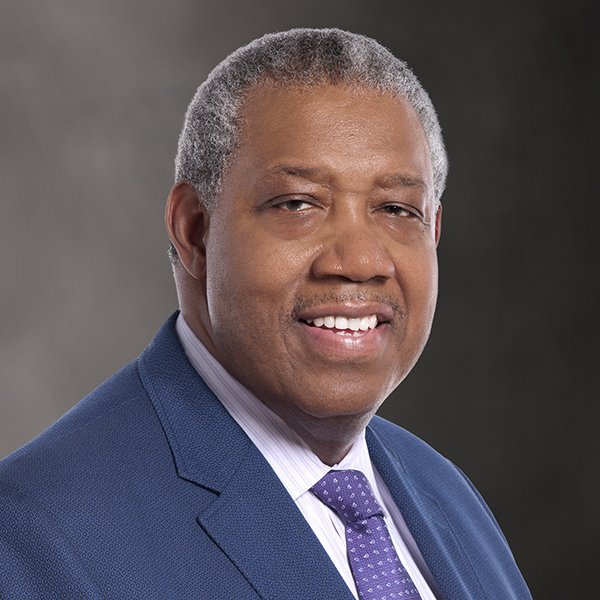James Cash Honored in Harvard Business School Building Renaming
|
View Video
BOSTON—Harvard Business School (HBS) today announced that it would honor James I. Cash, a retired HBS faculty member known for breaking barriers for Black people and for his leadership at the School, by renaming a building on its campus. The new Cash House name was unveiled in a virtual town hall attended by faculty, staff, and students. “When one thinks of individuals who have advanced racial equity in the US, many names come to mind,” said Harvard Business School Dean Nitin Nohria. “They are all leaders who, in ways that may be more or less visible yet always against all odds, realized tremendous personal achievements and also actively worked to lift others. Jim Cash is someone who exemplifies such leadership. Not only has he transcended many racial barriers in his own life, he also has propelled generations of Black students, faculty, and staff, as well as scores of business leaders, to successful and meaningful lives and careers.”
Cash joined the faculty of Harvard Business School in 1976 after receiving his MS and PhD degrees in computer science from Purdue University and became the first Black tenured professor at the School in 1985. It was the latest in a long line of remarkable accomplishments for a man already known as a trailblazer. Born and raised in Fort Worth, Texas, he was the first African American to accept a basketball scholarship in the Southwest Conference after signing on at Texas Christian University (TCU) in 1965. At six-foot-six, he dominated on the court and also in the classroom, where he majored in mathematics, becoming an Academic All-American in his last two years at TCU. As a Black student athlete in the south, he frequently encountered racism, even requiring a police escort when the team visited the University of Arkansas. While at HBS, Cash’s scholarly work focused on the still nascent field of information technology. He quickly became a sought-after expert on the strategic use of IT. In the classroom, Cash was a powerful role model; he taught both in the MBA Program and in Executive Education, including the Program for Management Development, the Program for Global Leadership, and the Advanced Management Program. He also became a leader in the administration, serving as Chairman of the MBA Program, Chair of Baker Library, and Senior Associate Dean and Chairman of Harvard Business Publishing. Beyond the School, his writing—in books, journals, and Harvard Business Review—caught the attention of CEOs of several major firms. Over time, his expertise, integrity, and judgment earned him seats, often as the first Black member, on the boards of Microsoft Corporation, Walmart, General Electric, Sprint, State Street Corporation, and The Chubb Ltd., among others. "True to his humble nature, Jim will not broadcast the many ways he makes a difference to individuals and institutions," noted Angela Crispi, HBS's Executive Dean for Administration. "But I've seen firsthand how he has been the first to help recruit and then reach out to colleagues at the School as they orient themselves to HBS and to Boston. And I've seen his eyes light up when he talks about projects like the Smithsonian National Museum of African American History and Culture, where he has served as an Advisory Council member since its founding in 2003, and his work with local organizations like Massachusetts General Hospital, Partners Healthcare, State Street Bank, and the Boston Celtics. More than anyone else I know, Jim genuinely believes in helping others realize their full potential." "It is impossible to overstate the impact that Jim has had on students, faculty, and business leaders over the years," said Linda Hill, Wallace Brett Donham Professor of Business Administration. "Not only have I witnessed it first-hand, I've personally benefited immeasurably from Jim's generosity and wisdom, and most of all, his friendship. For the Black community, he is an inspiration—a role model on what it means to be world class in all you do." Cash House, formerly named Glass House, is one of the 12 original buildings on the HBS campus when it was dedicated in 1928. Seven of these buildings were named for former secretaries of the United States Treasury at the suggestion of the School’s founding benefactor, George F. Baker. Carter Glass, Glass House's first namesake, served in the US House of Representatives for Virginia from 1902-1917 and as Treasury Secretary from 1918-1920, returning to the Senate for another 26 years until his death in 1946. His achievements in business include helping establish the Federal Deposit Insurance Corporation (FDIC) and passing the Federal Reserve Act. Yet these accomplishments are overshadowed by his active promulgation of segregationist policies in his home state, including poll taxes and literacy requirements that prevented many thousands of Black citizens from voting. Noted Dean Nohria in an announcement to the HBS community, "We… cannot allow the Glass name to remain at the School, even while we recognize and cannot forget that it has been a fact of our history for 75 years. It is important that members of our community see themselves in our spaces and take pride in those whose names define our physical landscape. Cash House will reflect our deepest belief that leaders are individuals of not just great competence, but also outstanding and impeccable character." |
Mark Cautela
mcautela+hbs.edu
617-495-5143
About Harvard Business School
Harvard Business School, located on a 40-acre campus in Boston, was founded in 1908 as part of Harvard University. It is among the world's most trusted sources of management education and thought leadership. For more than a century, the School's faculty has combined a passion for teaching with rigorous research conducted alongside practitioners at world-leading organizations to educate leaders who make a difference in the world. Through a dynamic ecosystem of research, learning, and entrepreneurship that includes MBA, Doctoral, Executive Education, and Online programs, as well as numerous initiatives, centers, institutes, and labs, Harvard Business School fosters bold new ideas and collaborative learning networks that shape the future of business.

